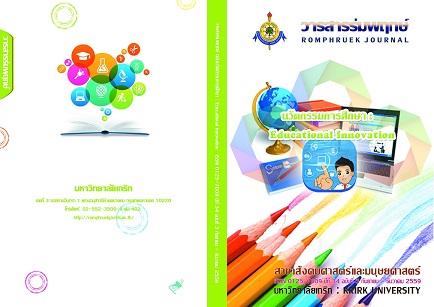กลวิธีทางภาษาที่ใช้ในการตักเตือนในภาษาไทยและข้อคำนึงที่เป็นเหตุจูงใจ;Linguistic Strategies Used for Admonishing in Thai and Native Speakers’ Motivational Voncerns
Main Article Content
Abstract
บทความวิจัยนี้มีวัตถุประสงค์เพื่อต้องการศึกษากลวิธีทางภาษาที่ผู้พูดภาษาไทยใช้ในการตักเตือนคู่สนทนาและข้อคำนึงที่เป็นเหตุจูงใจหรือปัจจัยที่ผู้พูดภาษาไทยคำนึงถึงในการเลือกใช้กลวิธีทางภาษาในการตักเตือน ผลการวิจัยพบว่าผู้พูดภาษาไทยเลือกใช้กลวิธีทางภาษาแบบลดน้ำหนักความรุนแรงในการตักเตือนมากกว่ากลวิธีทางภาษาแบบตรงไปตรงมา ส่วนข้อคำนึงที่เป็นเหตุจูงใจหรือปัจจัยที่ผู้พูดภาษาไทยคำนึงถึงในการใช้กลวิธีทางภาษาในการตักเตือนมี 2 ส่วน คือ 1) ข้อคำนึงที่เป็นเหตุจูงใจหรือปัจจัยในส่วนที่เป็นวัตถุประสงค์ของการสนทนา และ 2) ข้อคำนึงที่เป็นเหตุจูงใจหรือปัจจัยในส่วนที่เป็นปริบทของการสนทนา โดยการรักษาความสัมพันธ์ของคู่สนทนาเป็นข้อคำนึงที่เป็นเหตุจูงใจหรือปัจจัยที่ผู้พูดภาษาไทยส่วนใหญ่คำนึงถึงมากที่สุดในการใช้กลวิธีทางภาษาในการตักเตือน พฤติกรรมทางภาษาดังกล่าวมีความสัมพันธ์กับปัจจัยทางสังคมวัฒนธรรม 3 ประการ ได้แก่ 1) การมีมุมมองตัวตนแบบพึ่งพา (an interdependent view of self) 2) ความเป็นสังคมแบบอิงกลุ่ม (collectivism)และ 3) ความเป็นวัฒนธรรมปริบทสูง (High context culture)
This research article aims to study linguistic strategies that Thais adopts to admonish, as well as to study native speakers’ motivational concerns while performing the act. The results indicated that Thai speakers adopted mitigating strategies more frequently than bold-on record strategies. An analysis of native speakers’ motivational revealed that there were two types of motivational concerns-1) motivational concerns relating to the purpose of conversation 2) motivational concerns relating to the context of conversation. It found that Thai speakers placed a priority on keeping relationship with the interlocutor. This linguistics behavior might be motivated by three sociocultural factors : 1) An interdependent view of self 2) Collectivism and 3) High context culture.
Article Details
Every article published in the Romphruek Journal of the Humanities and Social Sciences is the opinion and point of view of the authors. Thery're not the viewpoint of Krirk University or the editored department. Any part or all of the articles for pablication must be clearly cited.
References
ชาญวิทย์ เยาวฤทธา. (2554). วัจนกรรม 3 ชนิดกับแนวคิดเรื่องยุญคุณในสังคมไทย. คณะอักษรศาสตร์ จุฬาลงกรณ์มหาวิทยาลัย, กรุงเทพฯ.
ณัฐพร พานโพธิ์ทอง. (2555). เอกสารคำสอนรายวิชการวิเคราะห์ภาษาไทยตามแนววัจนปฏิบัติศาสตร์. คณะอักษรศาสตร์ จุฬาลงกรณ์มหาวิทยาลัย.
ณัฐพร พานโพธิ์ทอง และ ศิริพร ภักดีผาสุข. (2557). ผู้พูดภาษาไทยปฎิสัมพันธ์อย่างไรในการสนทนาแบบเน้นภารกิจ : การศึกษาข้อมูล Mister O ตามแนว Emancipatory Pragmatics. การสัมมนาวิชาการภาษาและภาษาศาสตร์ประจำปี 2557 ภาควิชาภาษาศาสตร์ คณะศิลปศาสตร์ มหาวิทยาลัยธรรมศาสตร์, กรุงเทพฯ.
พักตร์วิภา เอื้ออมรวณิช. ปัจจัยที่มีผลต่อความเงียบในห้องเรียนของนักศึกษาไทยในระดับอุดมศึกษา. คณะโบราณคดี มหาวิทยาลัยศิลปากร, กรุงเทพฯ.
เมตตา วิวัฒนานุกูล. (2549). การสื่อสารต่างวัฒนธรรม. กรุงเทพฯ : สำนักพิมพ์แห่งจุฬาลงกรณ์มหาวิทยาลัย.
สิทธิธรรม อ่องวุฒิวัฒน์. (2549). วัจนกรรมการตักเตือนในภาษาไทย : กรณีศึกษาครูกับศิษย์. คณะอักษรศาสตร์ จุฬาลงกรณ์มหาวิทยาลัย, กรุงเทพฯ.
สุพัตรา สุภาพ. (2529). สังคมและวัฒนธรรมไทย : ค่านิยม ครอบครัว ศาสนาและประเพณี. กรุงเทพฯ : ไทยวัฒนาพานิช.
Hall, S. (1976). Visual culture : the reader. London : SAGE Publications in association with the Open University.
Hanks,W, Ide,S and Katagiri,Y. (2009). Introduction Towards an emancipatory pragmatics. Journal of Pragmatics, (41), 1-9.
Hofstede,G. (1987). Culture's consequences : international differences in work related values. Beverly Hills : Sage Pub.
Klauser, W, J. (1981). Reflections on Thai Culture. Bangkok : Suksit Siam.
Markus, H.R., andKitayama, S. (1991). Culture and the Self : Implications for Cognition, motion and Motivation. Psychological Review, 98(2), 224-253.
Mulder, N. (1996). Inside Thai society : An interpretations of everyday life. Amsterdam : Pepin Press.
Pongsapich, A. (1998). Traditional and changing Thai world view. Bangkok : Chulalongkorn University Press.
Roongrengsuke, S., and D. Chansuthus. (1998). Conflict management in Thailand. Conflict management in the Asia Pacific assumptions and approaches in diverse culture, 167-221.
Triandis, H, C. (1995). Individualism and collectivism. Boulder : Westview Press.


